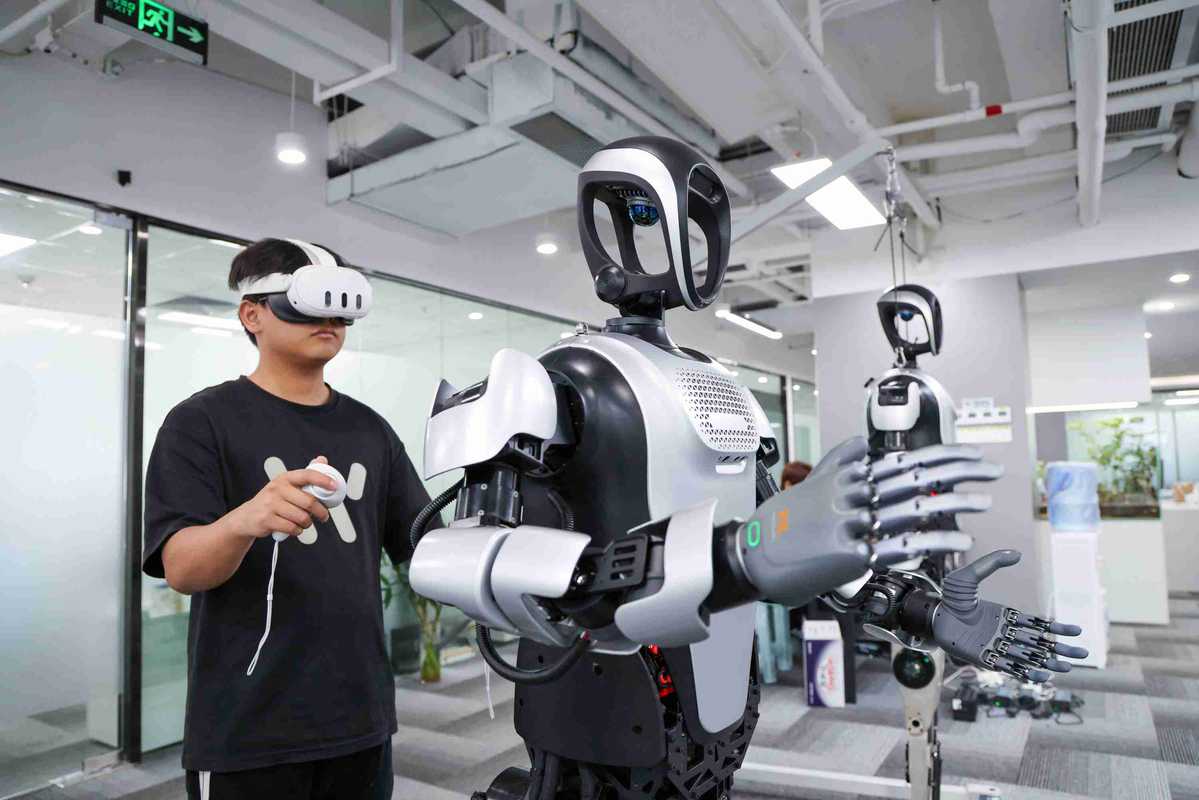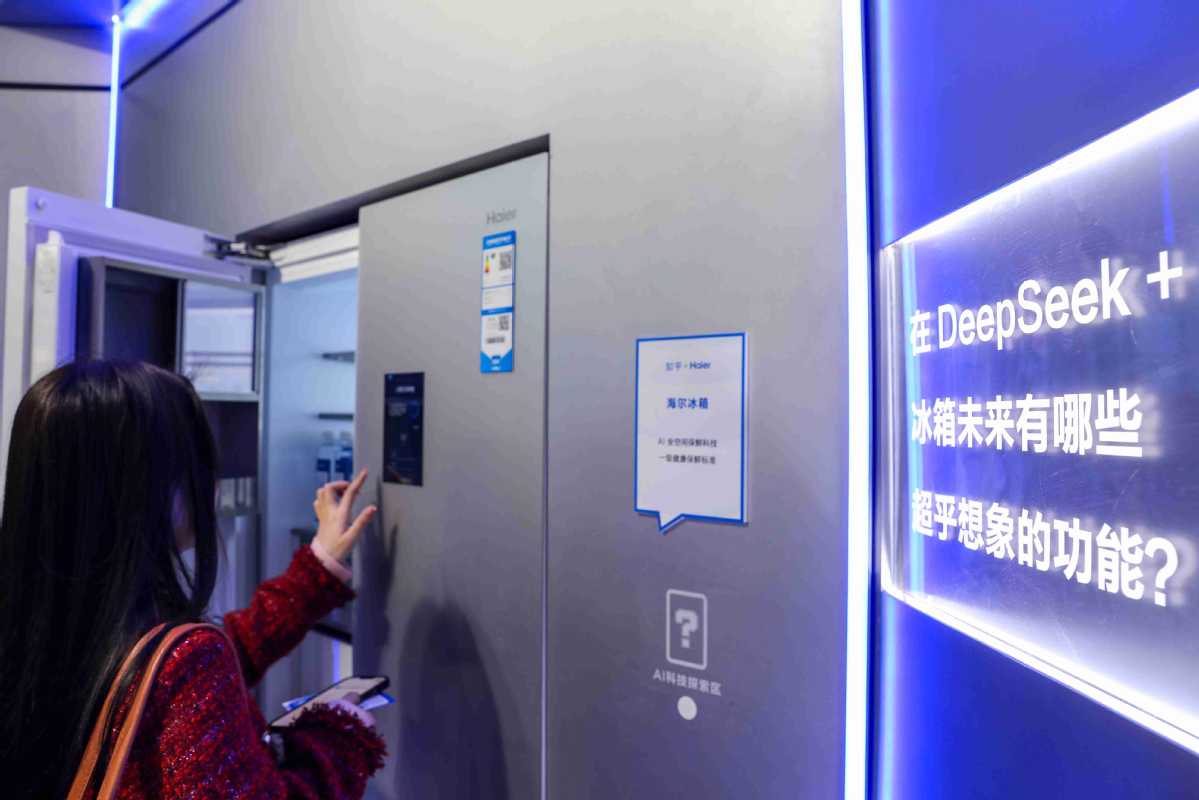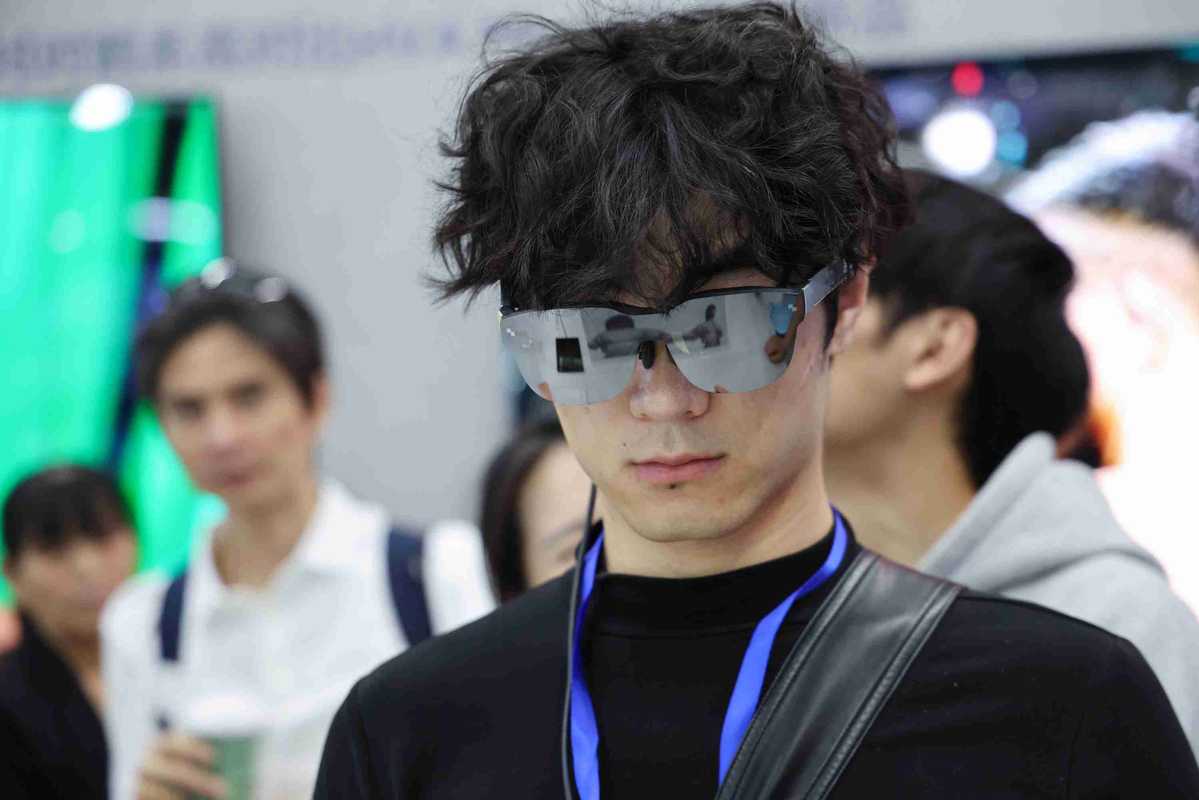
A technician debugs a humanoid robot at a technology company in Shenzhen, Guangdong province, on March 27. LIANG XU/XINHUA
China's emphasis on bolstering the application of fast-evolving artificial intelligence technology in a wide range of sectors will advance industrial upgrades and inject fresh momentum into high-quality economic growth, while creating immense business opportunities for multinational corporations to invest in the country, said industry experts and company executives.
Amid a backdrop of sweeping new tariffs by the United States, they said that it is vital for Chinese technology enterprises to bolster innovation and achieve tech breakthroughs in AI, so as to enhance China's core competitiveness in the strategic emerging field globally and navigate challenges from escalating trade protectionism.
Meanwhile, Chinese AI startup DeepSeek's cost-effective and open-source models serve as a catalyst to accelerate China's adoption of AI, while the country's super-large market, technological prowess and thriving innovation ecosystem underpin its capacity to drive technologies from research labs into the industrial arena, they added.
This year's Government Work Report stated that under the AI Plus initiative, the nation will work to effectively combine digital technologies with its manufacturing and market strengths. China will support the extensive application of large-scale AI models, and vigorously develop new-generation intelligent terminals and smart manufacturing equipment, the report said.
Global market research company International Data Corp said in a report that AI is forecast to contribute $19.9 trillion to the global economy through 2030, and drive 3.5 percent of global GDP in 2030.
By automating routine tasks and unlocking new efficiencies, AI will have profound economic consequences by reshaping industries, creating new markets and altering the competitive landscape, it noted.
Xu Sitao, chief economist of Deloitte China, said the scale of China's AI sector is expected to have reached 319.4 billion yuan ($43.7 billion) in 2024, and AI will be applied into various industries such as manufacturing, healthcare, finance, agriculture, retail, logistics and promote the digital and intelligent transformation and upgrading of these industries.
Stefan Hartung, chairman of the board of management at German industrial conglomerate Robert Bosch GmbH, said the company has leveraged AI technology in autonomous driving, home appliance products and factories in China.
"Our Chinese colleagues are very good at that, so they are taking the newest technologies, applying them and inventing new ones, which is a good thing," Hartung said in a recent interview with China Daily, adding that he is bullish on prospects for the application of cutting-edge AI technology in the Chinese market.
He said Bosch has collaborated with many Chinese AI companies, such as autonomous driving startup WeRide. "There are many other cooperation arrangements we have with AI companies in China, so it makes perfect sense to do this in cooperation."
He hailed China's recent achievements in the AI sector, such as the meteoric rise of DeepSeek, which has stunned the world with its latest reasoning models. "That's a good contribution to the world because an open-source model is always a contribution for many people who do research like we do on AI."
"China definitely has a lot of potential in using AI, and I think going forward, we will also see a lot of applications, maybe in robotics, but maybe in automotives, maybe also core manufacturing operations. So, I think there are a lot of opportunities," he said.
Cui Jingyi, vice-president and general manager of industrial software developer Aveva China, said China is becoming the market with the most extensive application of AI technologies globally, bringing new opportunities for many companies including Aveva.

A visitor experiences a refrigerator, which is connected to the DeepSeek large model, during the 2025 Appliance & Electronics World Expo in Shanghai on March 20. [Photo provided to China Daily]
"We see AI as humanity's tool, an exciting innovation that will help meet the sustainability goals and do more with less. Industrial technology, especially AI, can turbo-charge industries' progress toward efficiency and sustainability," Cui said.
For instance, the speed and scale of data analysis will be significantly improved by leveraging AI, which will help companies quickly assimilate new information and boost operational productivity, she said.
The United Kingdom-based company will deepen its cooperation with Chinese industrial enterprises and help them optimize production processes, improve product quality, and reduce energy consumption and costs by leveraging cutting-edge digital technologies including AI.
Cui said she is confident in China's ability to maintain its innovation capacity in breakthrough technologies in future with strong innovation capabilities and broad prospects for AI applications.
China's AI sector will make big strides in the next 10 to 15 years, with its market size reaching 1.73 trillion yuan by 2035, accounting for 30.6 percent of the global total, said market research company CCID Consulting.
China is not only a manufacturing powerhouse, but also a global innovation engine driving trends in digitalization, sustainability and high-tech industries, said Denis Depoux, global managing director of market consultancy Roland Berger. "What Chinese companies are super good at is usually adopting technology and making it practical."
It is quite critical for foreign companies to continue to invest in technological R&D in China, and there will be a lot of scientific discoveries and disruptions coming into innovation, Depoux said. He noted that AI is progressing very quickly in China, and DeepSeek is just one example as there will be another "DeepSeek" down the road.
"In the past decade, we have seen Chinese companies leapfrogging globally in many industries. China has made rapid progress in the development of AI technology, becoming one of the global leaders, and the pace will further accelerate. AI will unlock massive opportunities for our business," he said.
He said it is noteworthy that all or most of the LLMs of China are open-source. So, basically everybody can use them, including foreign companies, he said, believing that's contributing a lot to the growth of global AI industry, he added.
There is no doubt AI will continue to bring huge opportunities, yet the misuse of AI technology is also capable of creating serious worldwide risks and challenges.

A visitor tries a pair of intelligent glasses during the 13th China Information Technology Expo in Shenzhen on April 9. LIANG XU/XINHUA
Depoux said as one of the technology leaders, China should take more responsibility to promote sustainable development of AI technology and tackle challenges for all human beings through global collaboration on governance.
Noting that AI is seamlessly integrating into every facet of industrial development and people's lives, more efforts should be made to strengthen international cooperation to build an open, collaborative and innovative AI industrial ecosystem, said Ouyang Rihui, assistant dean of the China Center for Internet Economy Research at the Central University of Finance and Economics.
He added that China's inclusive attitude in AI will also help promote the coordinated advancement of the global AI industry.
"China is one of the front-runners in generative AI development in the Asia-Pacific region, and is actively utilizing such cutting-edge technology to modernize various sectors and cultivate talent," said Wu Chun, managing partner of Boston Consulting Group Greater China.
Chinese enterprises have demonstrated unique competitiveness in the use of AI, Wu said.
"By leveraging its diverse and complete industrial system, world-leading infrastructure, large-scale reserve of scientific and technological talent, and cluster-based innovation ecosystem, China will definitely sustain innovation in breakthrough technologies and continue to promote achievements in fields such as AI adoption," Wu said.
According to BCG's research, the global AI adoption landscape presents a significant imbalance. Notably, only five economies are categorized as AI pioneers, and the Chinese mainland is among them.
As an AI pioneer, the Chinese mainland has gained a competitive advantage in skills, research and development, ecosystems and investment, and is taking the lead in patents and AI academic papers, the research said.
Wu added that industrial transformation and upgrading, coupled with continuous breakthroughs in innovative technologies, have created more development space and cooperation opportunities for foreign enterprises, allowing them to share long-term results and benefits through collaborative innovation.
"We have seen China's technological innovation rise rapidly over the past few decades, bringing breakthrough innovations in multiple fields," she said.
The open-source ecosystem and exploration of AI application scenarios are reconstructing the path of tech evolution, she added.
Chinese enterprises are accelerating the adoption of generative AI technology. According to a report from Accenture, 87 percent of surveyed Chinese companies plan to ramp up AI investment in 2025 — a year of rapid change — while 58 percent of the interviewed business executives in China feel that their enterprises' AI development is proceeding faster than expected.
Chinese enterprises' current investment in generative AI is mainly concentrated on core technology infrastructure and data, such as AI platforms, cloud and data management, and talent and skills development, Accenture said in the report.
The report also found that about 85 percent of the interviewed Chinese employees are currently using generative AI-based tools in their work, with 63 percent leveraging these tools for more than a year, and their main purpose is for data analysis. The survey interviewed 790 company executives and 687 employees in 22 industries across the Asia-Pacific region.
Yu Yi, technology lead at Accenture China, said that as companies strive to stay ahead and adapt to fast-changing markets, they are increasingly turning to AI technology to fuel their innovation efforts.
The proportion of Chinese companies stepping up investment and boosting the application of AI is also rising dramatically, Yu said.
He added that Chinese enterprises have sped up digital transformation in their globalization push, with more generative AI technologies having been adopted amid enterprises' efforts to expand their footprint in overseas markets.
 Editor:Qiu Xiaochen
Editor:Qiu Xiaochen